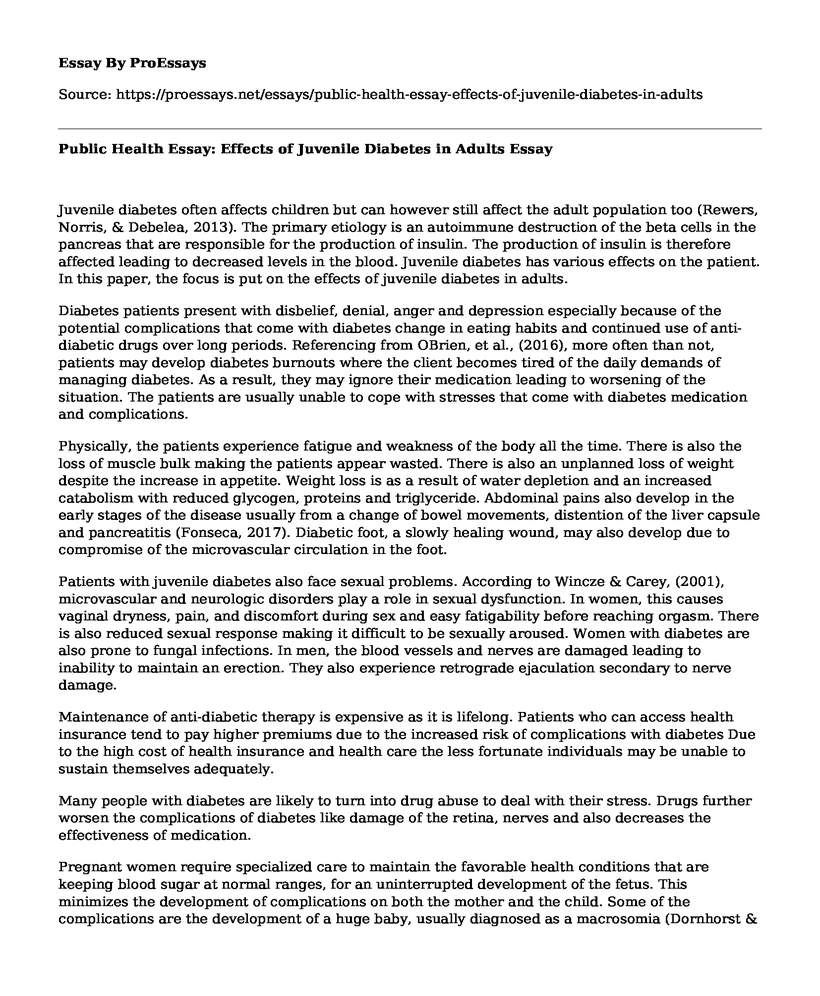Juvenile diabetes often affects children but can however still affect the adult population too (Rewers, Norris, & Debelea, 2013). The primary etiology is an autoimmune destruction of the beta cells in the pancreas that are responsible for the production of insulin. The production of insulin is therefore affected leading to decreased levels in the blood. Juvenile diabetes has various effects on the patient. In this paper, the focus is put on the effects of juvenile diabetes in adults.
Diabetes patients present with disbelief, denial, anger and depression especially because of the potential complications that come with diabetes change in eating habits and continued use of anti-diabetic drugs over long periods. Referencing from OBrien, et al., (2016), more often than not, patients may develop diabetes burnouts where the client becomes tired of the daily demands of managing diabetes. As a result, they may ignore their medication leading to worsening of the situation. The patients are usually unable to cope with stresses that come with diabetes medication and complications.
Physically, the patients experience fatigue and weakness of the body all the time. There is also the loss of muscle bulk making the patients appear wasted. There is also an unplanned loss of weight despite the increase in appetite. Weight loss is as a result of water depletion and an increased catabolism with reduced glycogen, proteins and triglyceride. Abdominal pains also develop in the early stages of the disease usually from a change of bowel movements, distention of the liver capsule and pancreatitis (Fonseca, 2017). Diabetic foot, a slowly healing wound, may also develop due to compromise of the microvascular circulation in the foot.
Patients with juvenile diabetes also face sexual problems. According to Wincze & Carey, (2001), microvascular and neurologic disorders play a role in sexual dysfunction. In women, this causes vaginal dryness, pain, and discomfort during sex and easy fatigability before reaching orgasm. There is also reduced sexual response making it difficult to be sexually aroused. Women with diabetes are also prone to fungal infections. In men, the blood vessels and nerves are damaged leading to inability to maintain an erection. They also experience retrograde ejaculation secondary to nerve damage.
Maintenance of anti-diabetic therapy is expensive as it is lifelong. Patients who can access health insurance tend to pay higher premiums due to the increased risk of complications with diabetes Due to the high cost of health insurance and health care the less fortunate individuals may be unable to sustain themselves adequately.
Many people with diabetes are likely to turn into drug abuse to deal with their stress. Drugs further worsen the complications of diabetes like damage of the retina, nerves and also decreases the effectiveness of medication.
Pregnant women require specialized care to maintain the favorable health conditions that are keeping blood sugar at normal ranges, for an uninterrupted development of the fetus. This minimizes the development of complications on both the mother and the child. Some of the complications are the development of a huge baby, usually diagnosed as a macrosomia (Dornhorst & Hadden, 2016).
Employers should ensure that screening and evaluate of individuals with diabetes should be done to makes provide the favorable working conditions. It is important that safety concerns for diabetics who are employed are put into consideration (Tunceli, et al., 2005). Individual tasks that may place the patients in danger in case they suffer a hypoglycemic attack should be substituted with light tasks which are safer.
In conclusion, diabetes does affect the patient not only physically, but also emotionally, mentally, sexually economically and every aspect of the patient's life in general. A diabetic should be supported medically but also in all areas of the patient's well-being that are affected.
References
Dornhorst, A., & Hadden, D. R. (2016). Diabetes and pregnancy : an international approach to diagnosis and management. New York : J. Wiley: Chichester.
Fonseca, V. A. (Ed.). (2017, June). Understanding Diabetes. Journal of Diabetes and its Complications , 31(6). Retrieved from http://www.jdcjournal.com/
OBrien, C. L., Ski, C. F., Thompson, D. R., Moore, G., Mancuso, S., Jenkins, A., . . . Castle, D. J. (2016, December 9). The Mental Health in Diabetes Service (MINDS) to enhance psychosocial health: study protocol for a randomized controlled trial. Biomed Central. doi:10.1186/s13063-016-1561-4
Rewers, M., Norris, J., & Debelea, D. (2013). Etitology of Type 1 Diabetes Mellitus. In G. S. Eisenbarth, Immunology of type 1 diabetes (2nd ed., Vol. 562, pp. 219-221). New York: Kluwer Academics ./Plenum Publ ; Georgetown, . Retrieved from Landes Bioscience/Eurekah.com.
Tunceli, K., Bradley, C. J., Nerenz, D., Williams, K., Pladevall, M., & Lafata, J. E. (2005, November 28). The Impact of Diabetes on Employment and Work Productivity. (A. D. Assosiation, Ed.) American Diabetes Association., 11.
Wincze, J. P., & Carey, M. P. (2001). Sexual dysfunction : a guide for assessment and treatment. New York: The Guilford Press Corporation.
Cite this page
Public Health Essay: Effects of Juvenile Diabetes in Adults. (2021, Jun 22). Retrieved from https://proessays.net/essays/public-health-essay-effects-of-juvenile-diabetes-in-adults
If you are the original author of this essay and no longer wish to have it published on the ProEssays website, please click below to request its removal:
- Assignments on Eating Habits
- Volunteering in a Physical Therapy Clinic in an Underprivileged Part of Los Angeles
- Paper Example on Overcoming MDD: A Patient's Journey & Evidence-Based Strategies
- Essay Example on Natural & Human-Made Disasters: Causes & Effects
- Essay Example on Emergency Management Plan: Onsite Childcare & Partnerships
- Paper Example on Nurse Julia Brown: Helping the Needy in Africa
- Essay Example on Unhealthy Eating Habits: Please Do Not Feed the Humans







